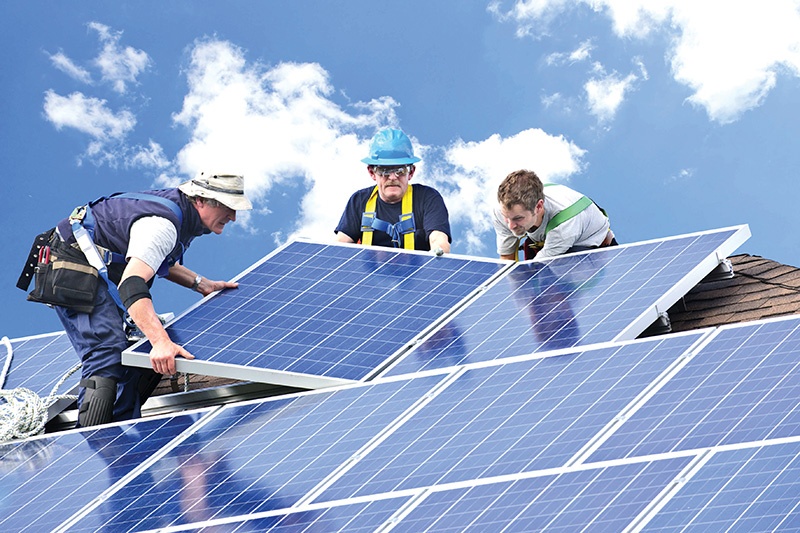Rooftop solar power taking off in industrial zones
 |
| Solar panels help reduce heat absorption by nearly 40 per cent. Photo: Shutterstock |
Sojitz Corporation, Hong Duc Industry JSC (part of DEEP C Industrial Zones), and Bamboo Capital Group have signed an MoU on tri-party cooperation to develop a $250 million industrial zone (IZ) and ancillary infrastructure. The signing ceremony occurred within the framework of the Investment Promotion Conference in Japan during Prime Minister Pham Minh Chinh’s official visit at the end of last month.
The highlight of the tri-party combination is that they set the target to develop the first IZ in Vietnam that is fully energy independent by enhancing the generation and consumption of renewable energy via the installation of rooftop solar power systems.
Meanwhile, in late October, Sojitz Osaka Gas Energy Co., Ltd., a joint venture company between Sojitz Corporation and Osaka Gas Co., Ltd., partnered with Looop Inc. to establish SOL Energy Co., Ltd. It will begin operations of a rooftop solar power generation business geared towards industrial and commercial customers in Vietnam.
Ishii Hiroyuki, general director of Long Duc Industrial Park, told VIR, “Due to growing interest in decarbonisation, concerns about rising electricity prices due to the effects of new power development, and soaring fuel prices, it can be inferred that the need for installing rooftop solar power of tenants in IZs will be increasing, so I think it is meaningful to work with solar power generation companies to decentralise power sources and reduce the impact of the transmission and distribution network.”
The rooftop solar power system is being processed in installing at Long Duc Industrial Park, of which Sojitz is the largest shareholder.
Ho Chi Minh City Export Processing Zone and Industrial Park Authority calculated that when reaching the target of 1,000 MWp of rooftop solar power for more than 1,000 enterprises in the period 2020-2024, electricity consumption will be reduced 10-15 per cent, equivalent to 23 million tonnes of CO2. Moreover, according to a study by the University of California, solar panels also help reduce heat absorption by 38 per cent.
Despite the potential, however, installation of rooftop solar power systems in IZs face numerous drawbacks. Tran Dang Khoi, Vietnam country manager at Indian energy producer Hero Future Energies Pvt., Ltd., told VIR, “At present, we are approaching manufacturers that buy electricity from Electricity of Vietnam (EVN) to pursue them to switch to renewable energy. However, the barrier is that a large volume of manufacturers in IZs are buying electricity from the intermediate party, instead of EVN, so it is difficult to negotiate with customers because of the intermediate party’s disapproval.”
Another concern, Khoi said, is that the oversupply of power from rooftop solar in collaboration with the plunge in electricity in IZs due to the pandemic and violations from some renewables developers “force the government to issue policies to hold back the growth of this sector, including the requirement of additional dossiers for getting the licence for projects, even projects starting operation before the start of this year.”
Khoi noted that the Ministry of Industry and Trade and EVN have not yet issued further instructions on procedures for electricity purchases and sale contracts, and payments for purchased electricity from rooftop solar systems, which he said is alarming renewable energy developers.
What the stars mean:
★ Poor ★ ★ Promising ★★★ Good ★★★★ Very good ★★★★★ Exceptional
Related Contents
Latest News
More News
- Sembcorp Development secures licence for VSIP in Khanh Hoa (December 31, 2025 | 18:54)
- Prodezi Long An advances towards integrated eco-centric industrial park model (December 26, 2025 | 11:16)
- Amata to develop $185 million Amata City Phu Tho (December 23, 2025 | 17:49)
- Work starts on Nhat Ban – Haiphong Industrial Zone Phase 2 (December 19, 2025 | 16:43)
- Becamex – Binh Phuoc drives sustainable industrial growth (November 28, 2025 | 15:22)
- South Korean investors seek clarity on IP lease extensions (November 24, 2025 | 17:48)
- CEO shares insights on Phu My 3 IP’s journey to green industrial growth (November 17, 2025 | 11:53)
- Business leaders give their views on ESG compliance in industrial parks (November 15, 2025 | 09:00)
- Industrial parks pivot to sustainable models amid rising ESG demands (November 14, 2025 | 11:00)
- Amata plans industrial park in Ho Chi Minh City (November 04, 2025 | 15:49)

 Tag:
Tag:




















 Mobile Version
Mobile Version